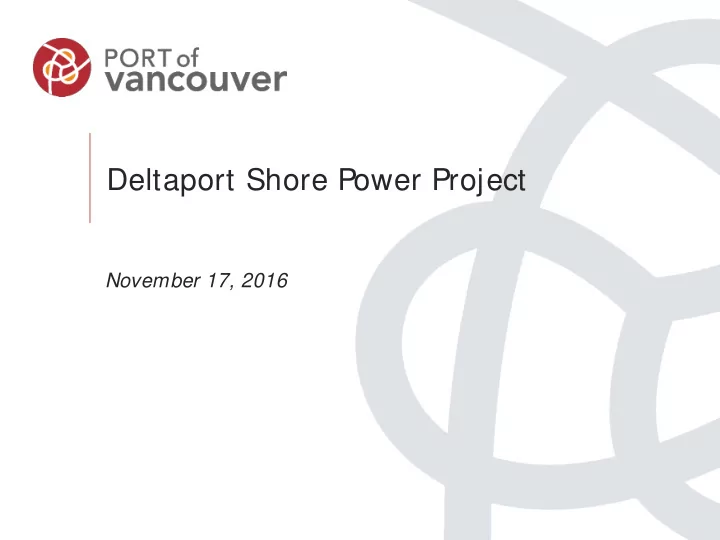

Deltaport Shore Power Project November 17, 2016
Container Shore Power Projects • In 2015, federal government/ VFP A announced funding for installation of shore power at two terminals - Deltaport and Centerm • Project funding is approx. $14 million: $7 million from T ransport Canada’s Shore P ower T echnology for P orts Program and $7 million from VFP A • Working to make shore power connections available and incenting shipping lines to use shore power through harbour dues discounts 2
Rationale • Shipping line readiness: 2012 study suggested an increasing number of shore power equipped container vessels are expected to call at Port of Vancouver • Provisioning of shore power facilities recommended • Regulatory environment: shore power compliance is voluntary
Shore Power Locations Centerm Canada Place (Cruise) Deltaport
Key Items Needed • Funding agreement • Favorable rate structure from BC Hydro • Operating agreements • T erminal resources available and committed to project • Confirmed standard technology
Deltaport Third Berth Transformer yard Berth 1 Berth 3 HVSC substation Berth 2 1 2 Berth 3 • T wo HVSC pits to support port side berthing • BC Hydro 69 kV transmission service 6
Cables Connecting to Shore Power
High Voltage Shore Connection Pit Pit open Pit closed Note hinge and locking pin, in some installations the bull rail is on rollers
High Voltage Shore Connection Equipment Receptacle pit with junction box and connector plugs Removable cover to accommodate cable access from ship
Berth 3 High Voltage Shore Connection Locations 10
Shore Power Deltaport Shore Power Preliminary Design Transformer Switchgear Duct Bank Service Tunnel 9+91m 11 10+77m 6+94m 7+59m Starboard Side HVSC Port Side HVSC (pending funding)
Transformer Shore Power Transformer Substation 12
Schedule
2015 Shore Power Capable Ship Calls Container term inal # of shore pow er capable calls Deltaport 44 Centerm 36 • Actual number of connections will depend on: • Configuration of land based equipment • Location and limitations of ship based equipment • Ship willingness to connect • Cost of connection • Availability of power from BC Hydro 14
Key Benefits • Reduces air emissions • Improves air quality for terminal employees and community • Reduces noise impact • Improves crane productivity if operations stopped due to vessel fumes and in-shore winds 15
Environmental Benefits
Noise Reduction – Shore Power Mid Frequency 500 to 2000 Hz • Auxiliary engines shut down while at berth • Remaining sources of noise may include pumps, ventilation, refrigeration units, air conditioning Low Frequency 40 to 160 Hz
Noise Reduction – Low Frequency on Background 85 Post Leq shows lower dB values due to Leq Pre Departure the A-Weighting applied, which Arrival 40Hz discounts the lower frequencies. 80 75 LAeq(dB) 70 65 60 Vessel Berth 1 Vessel Berth 2 55
Noise Reduction – Sound Power Level (dBA) Noise Source Aux Shore Change ( Container Ship) Engine Pow er 107 119 105 111 2 – 8 Total ( calculated) Aux engine – funnel 100 115 n/ a n/ a Aux engine – ventilation 100 115 n/ a n/ a Main engine – ventilation 93 107 91 97 Bridge/ deck – ventilation 80 90 80 90 Reefers 105 111 105 111 • Internoise 2010, J. White, Noise from Moored Ships • Sample size 7; 8,000 to 80,000 DWT (1000 to 7000 TEU) • Sound Power Level – sound energy in Watts per Area
Community Communication Distribute notice to nearby residents 10 days prior to construction / physical activities which includes: • Description of works and activities • Hours of operation • Monday to Saturday between 7:00 am to 8:00 pm • No construction and physical activities during Sundays or holidays • Contact information
Construction Notification Mail Drop Area Map
Thank you
Recommend
More recommend